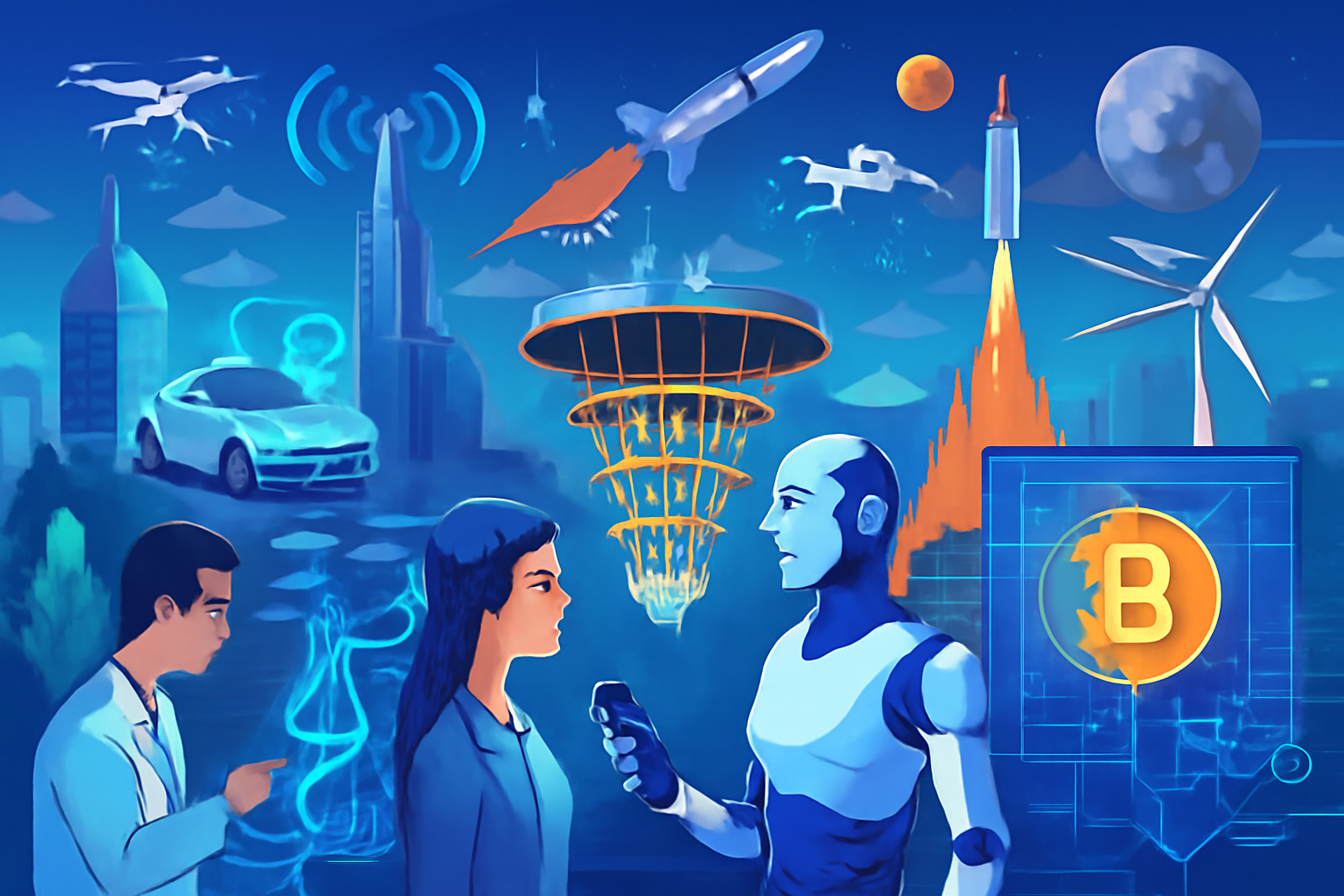In the fast-paced world of technology, change is constant. As we step into 2025, the technological landscape is evolving at an unprecedented rate. New innovations are emerging across various sectors, from artificial intelligence (AI) to space exploration, reshaping how we interact with the world. This article explores the latest advancements in technology and their implications for businesses, industries, and individuals alike.
1. Artificial Intelligence: The Power of Conversational AI
Artificial Intelligence has made significant strides in recent years, and 2025 is poised to be a pivotal year for AI. One of the most exciting developments in this field is the rise of conversational AI. These systems, which use natural language processing (NLP) and machine learning, are becoming increasingly sophisticated and capable of holding conversations that feel remarkably human.
AI chatbots and virtual assistants are now a staple in customer service, and their applications are extending into other sectors, including healthcare, education, and finance. In healthcare, AI is helping doctors diagnose diseases with greater accuracy, while in education, AI-driven platforms are providing personalized learning experiences.
As AI continues to evolve, we are likely to see even more human-like interactions between machines and humans. However, this also raises concerns about the ethical implications of AI, especially in areas like privacy, job displacement, and the control of information.
2. 5G and the Connected World
One of the most talked-about technologies in recent years is 5G. With the rollout of 5G networks in full swing, the next-generation connectivity is transforming how we communicate and interact with the digital world. In 2025, 5G is expected to become ubiquitous, enabling faster speeds, lower latency, and more reliable connections.
This enhanced connectivity will open up new possibilities for the Internet of Things (IoT), enabling smart cities, autonomous vehicles, and advanced healthcare systems. For instance, 5G will allow for real-time monitoring of patients’ health, improving the delivery of medical services. In the transportation sector, self-driving cars and drones will benefit from 5G’s low-latency capabilities, enabling them to make split-second decisions.
Moreover, the rise of augmented reality (AR) and virtual reality (VR) will also benefit from 5G, enabling immersive experiences that were previously not possible due to bandwidth limitations.
3. Quantum Computing: The Next Frontier
While still in its early stages, quantum computing is one of the most exciting fields of technology. By harnessing the principles of quantum mechanics, quantum computers promise to solve complex problems that are beyond the capabilities of traditional computers. In 2025, advancements in quantum computing will bring us closer to realizing its potential in fields such as cryptography, materials science, and artificial intelligence.
One of the most significant advantages of quantum computing is its ability to perform calculations at an exponentially faster rate than classical computers. This has the potential to revolutionize industries such as pharmaceuticals, where quantum simulations could help discover new drugs more quickly. In cybersecurity, quantum encryption could offer nearly unbreakable security for data transmission, making it a game-changer for privacy protection.
4. The Rise of Blockchain Technology
Blockchain technology, once associated primarily with cryptocurrencies like Bitcoin, is now finding its way into various industries beyond finance. The latest developments in blockchain are focused on making it more scalable, secure, and efficient for a wide range of applications, including supply chain management, digital identity verification, and even voting systems.
In 2025, blockchain is expected to play a crucial role in creating transparent and decentralized systems. Its ability to provide immutable records makes it an excellent tool for industries that require trust and transparency, such as healthcare, where patient data can be securely stored and accessed by authorized personnel. Blockchain is also being explored as a means to ensure the authenticity of products in global supply chains, helping to combat fraud and ensure the integrity of goods.
5. Space Exploration: A New Era of Discovery
The space industry is entering a new era of exploration, with private companies and government agencies alike making groundbreaking advancements. The launch of SpaceX’s Starship, NASA’s Artemis program, and other private ventures are bringing humanity closer to the Moon, Mars, and beyond.
In 2025, we are likely to see the first human missions to Mars, which will mark a significant milestone in the pursuit of interplanetary colonization. Space tourism, though still in its infancy, is expected to become more accessible, with companies like Blue Origin and Virgin Galactic offering commercial space flights.
Beyond tourism, the focus on space exploration will have practical implications for technology development. For example, the advancements in rocket technology, materials science, and life-support systems being developed for space missions are likely to have applications here on Earth, driving innovation in industries such as energy, transportation, and manufacturing.
6. Biotechnology and Genetic Engineering
In the realm of biotechnology, 2025 will bring about revolutionary changes. Advancements in gene editing technologies, particularly CRISPR, are enabling scientists to make precise modifications to DNA, opening up possibilities for curing genetic diseases, improving crop yields, and even extending human lifespan.
In healthcare, CRISPR and other gene-editing tools will be used to treat diseases like cancer, cystic fibrosis, and sickle cell anemia by correcting genetic mutations at the source. This has the potential to revolutionize the way we approach medicine, moving from reactive treatments to proactive, personalized care.
Furthermore, synthetic biology is pushing the boundaries of what’s possible in bio-manufacturing, with the creation of lab-grown organs, biofuels, and even custom-designed microorganisms. These innovations will have far-reaching implications for sustainability and the future of healthcare.
7. Sustainable Tech: Building a Greener Future
As the world faces the growing threat of climate change, the demand for sustainable technologies is at an all-time high. In 2025, the focus on renewable energy, electric vehicles (EVs), and green technologies will continue to gain momentum.
Solar and wind power technologies are becoming more efficient and cost-effective, helping to reduce the world’s reliance on fossil fuels. Battery storage technology is also improving, allowing for better management of renewable energy sources and ensuring a steady power supply even when the sun isn’t shining or the wind isn’t blowing.
Electric vehicles are expected to become the standard mode of transportation by 2025, with major automakers like Tesla, Ford, and GM ramping up production of EVs. The widespread adoption of EVs will reduce carbon emissions and decrease air pollution, contributing to a cleaner, more sustainable future.
Conclusion
As we enter 2025, the technological landscape is brimming with possibilities. From artificial intelligence and quantum computing to sustainable energy solutions, the innovations we are seeing today will shape the world of tomorrow. However, with these advancements come challenges, including ethical concerns, privacy issues, and the need for equitable access to technology. As we continue to push the boundaries of what’s possible, it is crucial that we ensure these technologies benefit all of humanity and help create a more sustainable and connected future.




